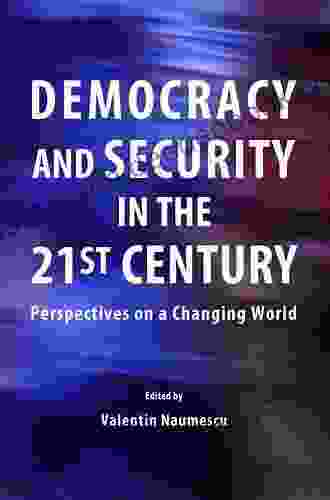The Ecology of Violent Extremism: An Exploration of Complex Causes and Systemic Interactions

5 out of 5
| Language | : | English |
| File size | : | 5034 KB |
| Text-to-Speech | : | Enabled |
| Screen Reader | : | Supported |
| Enhanced typesetting | : | Enabled |
| Word Wise | : | Enabled |
| Print length | : | 439 pages |
| Paperback | : | 344 pages |
| Item Weight | : | 1.17 pounds |
| Dimensions | : | 5.98 x 0.78 x 8.74 inches |
Violent extremism, a complex global phenomenon, poses significant threats to international peace, security, and stability. To effectively address this issue, it is crucial to delve into its intricate ecology, encompassing a multifaceted array of causes and systemic interactions. This article aims to provide a comprehensive understanding of the factors contributing to violent extremism, including individual, social, political, and economic aspects. By adopting a systems approach, we can unravel the interconnectedness of these elements, paving the way for more effective prevention and countermeasures.
Individual Factors
- Personality traits: Certain personality traits, such as high levels of anxiety, impulsivity, and aggression, may increase an individual's susceptibility to radicalization and violent behavior.
- Cognitive processes: Cognitive biases, distorted perceptions, and limited problem-solving abilities can lead to the adoption of extremist ideologies.
- Psychological trauma: Personal experiences of violence, abuse, and trauma can foster a sense of injustice, anger, and alienation, making individuals more vulnerable to extremist narratives.
- Social isolation and alienation: Lack of social support, feelings of loneliness, and disconnection from society can increase the risk of radicalization, particularly among marginalized and disenfranchised individuals.
- Perceived grievances: Real or perceived injustices, discrimination, and oppression can fuel feelings of anger, resentment, and a desire for revenge.
Social Factors
- Social inequality and discrimination: Economic disparities, social exclusion, and discrimination based on religion, ethnicity, or gender can create conditions of marginalization and resentment, making individuals more susceptible to extremist propaganda.
- Lack of opportunity and empowerment: Unemployment, poor education, and limited access to political participation can contribute to a sense of hopelessness and dissatisfaction, which can be exploited by extremist groups.
- Social networks and peer influence: Extremist ideologies can spread through social networks, where individuals can be exposed to radicalizing content and influenced by peers who share similar views.
- Community conflicts and violence: Inter-group tensions, ethnic strife, and communal violence can create an atmosphere of fear and insecurity, leading to the emergence and proliferation of extremist groups.
- Weak social institutions and governance: Corruption, ineffective law enforcement, and lack of trust in government and other social institutions can undermine social cohesion and contribute to the erosion of public safety.
Political Factors
- Authoritarian regimes and political repression: Suppressive political systems, characterized by limited freedoms, human rights violations, and lack of political participation, can foster resentment and dissatisfaction, providing fertile ground for extremist recruitment.
- Conflict and instability: Protracted conflicts, civil wars, and state fragility can create conditions of chaos and anarchy, allowing extremist groups to flourish and exploit the power vacuum.
- Ideological extremism and hate speech: Political ideologies that promote intolerance, exclusion, and violence can contribute to the spread of extremist narratives and legitimize acts of violence against targeted groups.
- Foreign intervention and military operations: Military interventions and perceived foreign interference can fuel anti-Western sentiment, foster a sense of national humiliation, and provide a rallying point for extremist mobilization.
- Polarization and fragmentation of political discourse: Intense political polarization and the breakdown of civil dialogue can create a hostile environment where extremist views are more likely to gain traction.
Economic Factors
- Poverty and economic inequality: Economic deprivation, unemployment, and lack of economic opportunities can create conditions of despair and hopelessness, making individuals more susceptible to extremist recruitment.
- Illicit economies and criminal networks: Extremist groups often engage in criminal activities, such as drug trafficking, smuggling, and extortion, to fund their operations and exploit vulnerable populations.
- Corruption and mismanagement of resources: Corruption, embezzlement, and mismanagement of public funds can undermine economic development, increase inequality, and foster a sense of injustice and resentment.
- Environmental degradation and resource scarcity: Climate change, desertification, and resource depletion can lead to displacement, loss of livelihoods, and competition over scarce resources, creating conditions that can be exploited by extremist groups.
- Globalization and economic competition: Rapid globalization and economic interdependence can create feelings of dislocation and insecurity, particularly among those who feel left behind in the globalized economy.
Violent extremism is a complex phenomenon that defies easy explanations. It is rooted in a confluence of individual, social, political, and economic factors that interact in intricate ways. To effectively address this challenge, we need to adopt a systems approach that recognizes the interconnectedness of these elements and considers the broader context in which violent extremism emerges. Prevention and countermeasures should focus on addressing root causes, promoting social and economic inclusion, fostering dialogue and tolerance, and strengthening governance and rule of law. By understanding the multifaceted ecology of violent extremism, we can develop comprehensive and effective strategies to mitigate its risks and promote peace and stability worldwide.
5 out of 5
| Language | : | English |
| File size | : | 5034 KB |
| Text-to-Speech | : | Enabled |
| Screen Reader | : | Supported |
| Enhanced typesetting | : | Enabled |
| Word Wise | : | Enabled |
| Print length | : | 439 pages |
| Paperback | : | 344 pages |
| Item Weight | : | 1.17 pounds |
| Dimensions | : | 5.98 x 0.78 x 8.74 inches |
Do you want to contribute by writing guest posts on this blog?
Please contact us and send us a resume of previous articles that you have written.
 Book
Book Novel
Novel Page
Page Chapter
Chapter Genre
Genre Library
Library Paperback
Paperback Newspaper
Newspaper Paragraph
Paragraph Bookmark
Bookmark Shelf
Shelf Glossary
Glossary Bibliography
Bibliography Foreword
Foreword Preface
Preface Synopsis
Synopsis Footnote
Footnote Codex
Codex Tome
Tome Classics
Classics Narrative
Narrative Autobiography
Autobiography Reference
Reference Encyclopedia
Encyclopedia Narrator
Narrator Librarian
Librarian Card Catalog
Card Catalog Archives
Archives Periodicals
Periodicals Research
Research Lending
Lending Journals
Journals Reading Room
Reading Room Rare Books
Rare Books Special Collections
Special Collections Literacy
Literacy Dissertation
Dissertation Awards
Awards Book Club
Book Club Theory
Theory Julie Miller
Julie Miller Antonio Gulli
Antonio Gulli Avery Maxwell
Avery Maxwell John Mitchell
John Mitchell K M Shea
K M Shea Carline Anglade Cole
Carline Anglade Cole Kaye Draper
Kaye Draper Antony Loewenstein
Antony Loewenstein Patricia Shehan Campbell
Patricia Shehan Campbell Jack M Balkin
Jack M Balkin Claire Polders
Claire Polders Zen Cho
Zen Cho Kenny Dill
Kenny Dill Joan Jefferson Freeman
Joan Jefferson Freeman Larry Geller
Larry Geller Charles Frazier
Charles Frazier Charles Elias
Charles Elias Ina Koys
Ina Koys Florence M Jumonville
Florence M Jumonville Barbara Maat
Barbara Maat
Light bulbAdvertise smarter! Our strategic ad space ensures maximum exposure. Reserve your spot today!

 Robert FrostGone to the Dogs: A Dog Lover's Mystery Novel That Will Keep You on the Edge...
Robert FrostGone to the Dogs: A Dog Lover's Mystery Novel That Will Keep You on the Edge...
 Ronald SimmonsUnveiling the Gripping Psychological Thriller: A Labyrinth of Twists and...
Ronald SimmonsUnveiling the Gripping Psychological Thriller: A Labyrinth of Twists and... Alexander BlairFollow ·14.5k
Alexander BlairFollow ·14.5k Brian WestFollow ·13k
Brian WestFollow ·13k Charles BukowskiFollow ·7.8k
Charles BukowskiFollow ·7.8k Gene SimmonsFollow ·14.4k
Gene SimmonsFollow ·14.4k Austin FordFollow ·13.2k
Austin FordFollow ·13.2k Percy Bysshe ShelleyFollow ·3.6k
Percy Bysshe ShelleyFollow ·3.6k Jean BlairFollow ·9.4k
Jean BlairFollow ·9.4k Calvin FisherFollow ·3.4k
Calvin FisherFollow ·3.4k

 Ricky Bell
Ricky BellThe Marriage: An Absolutely Jaw-Dropping Psychological...
In the realm of...

 Ray Blair
Ray BlairDiscover the Enchanting Charm of Budapest and Its...
Nestled in the heart of...

 Tyrone Powell
Tyrone PowellHuddle: How Women Unlock Their Collective Power
Huddle is a global movement that empowers...

 Grayson Bell
Grayson BellThe Coin Story of the Holocaust: A Symbol of Hope and...
In the depths of the...

 Virginia Woolf
Virginia WoolfFolklore Performance and Identity in Cuzco, Peru: A...
Nestled amidst...

 Dylan Mitchell
Dylan MitchellThe Enduring Love Story of Héloïse and Abélard: A Tale of...
An Intellectual Passion In the heart of...
5 out of 5
| Language | : | English |
| File size | : | 5034 KB |
| Text-to-Speech | : | Enabled |
| Screen Reader | : | Supported |
| Enhanced typesetting | : | Enabled |
| Word Wise | : | Enabled |
| Print length | : | 439 pages |
| Paperback | : | 344 pages |
| Item Weight | : | 1.17 pounds |
| Dimensions | : | 5.98 x 0.78 x 8.74 inches |








